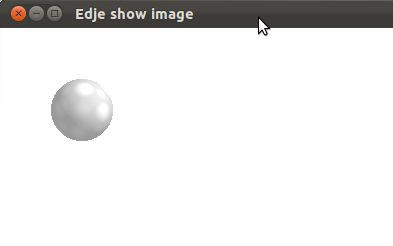|
Tizen Native API
7.0
|
In this example we will show how to load an image and move it across the window.
To load the image to our program, it needs to be declared in the .edc using the images block:
- Note:
- COMP means that we are using a lossless compression
Then to be able to use it in our window we must declare a part for this image:
Now we move to our .c file, you will notice this define:
#define WALK 10
This means how fast we want to move the image across the screen
To load our edje file we will use this command, we do just like the last example (Basic example):
if(!edje_object_file_set(edje_obj, edje_file, "image_group")) { int err = edje_object_load_error_get(edje_obj); const char *errmsg = edje_load_error_str(err); fprintf(stderr, "Could not load the edje file - reason:%s\n", errmsg); goto shutdown_edje; } evas_object_move(edje_obj, 50, 50); evas_object_resize(edje_obj, 64, 64); evas_object_show(edje_obj);
If we want to move our image, we need to add a callback to be able to do this, so we define:
evas_object_event_callback_add(bg, EVAS_CALLBACK_KEY_DOWN, _on_key_down, edje_obj);
To get the position of the image we use this:
evas_object_geometry_get(edje_obj, &x, &y, NULL, NULL);
Now we use the if's to check in what direction the user wants to move the image then we move it:
if(strcmp(ev->key,"Escape") == 0) { ecore_main_loop_quit(); } else if(strcmp(ev->key, "Down") == 0) { y+=WALK; } else if(strcmp(ev->key, "Up") == 0) { y-=WALK; } else if(strcmp(ev->key, "Right") == 0) { x+=WALK; } else if(strcmp(ev->key, "Left") == 0) { x-=WALK; } else { printf("Key %s not supported.\nCommands:%s", ev->key, commands); return; } evas_object_move(edje_obj, x, y);
The example's window should look like this picture:

The complete .edc file:
And the source code:
#ifdef HAVE_CONFIG_H # include "config.h" #else # define EINA_UNUSED #endif #ifndef PACKAGE_DATA_DIR #define PACKAGE_DATA_DIR "." #endif #include <stdio.h> #include <Eina.h> #include <Ecore.h> #include <Ecore_Evas.h> #include <Edje.h> #define WIDTH (700) #define HEIGHT (700) #define WALK 10 static const char commands[] = "commands are:\nEsc - Exit\nUp - move image up\nDown - move image down\n"\ "Right - move image to right\nLeft - move image to left\n"; static void _on_key_down(void *data, Evas *evas EINA_UNUSED, Evas_Object *o EINA_UNUSED, void *einfo) { Evas_Event_Key_Down *ev; Evas_Object *edje_obj; int x,y; ev = (Evas_Event_Key_Down *)einfo; edje_obj = (Evas_Object *)data; evas_object_geometry_get(edje_obj, &x, &y, NULL, NULL); if(strcmp(ev->key,"Escape") == 0) { ecore_main_loop_quit(); } else if(strcmp(ev->key, "Down") == 0) { y+=WALK; } else if(strcmp(ev->key, "Up") == 0) { y-=WALK; } else if(strcmp(ev->key, "Right") == 0) { x+=WALK; } else if(strcmp(ev->key, "Left") == 0) { x-=WALK; } else { printf("Key %s not supported.\nCommands:%s", ev->key, commands); return; } evas_object_move(edje_obj, x, y); } static void _on_delete(Ecore_Evas *ee EINA_UNUSED) { ecore_main_loop_quit(); } int main(int argc EINA_UNUSED, char **argv EINA_UNUSED) { const char *edje_file = PACKAGE_DATA_DIR"/basic2.edj"; Ecore_Evas *ee; Evas *evas; Evas_Object *bg; Evas_Object *edje_obj; if(!ecore_evas_init()) return EXIT_FAILURE; if(!edje_init()) goto shutdown_ecore_evas; ee = ecore_evas_new(NULL, 0, 0, WIDTH, HEIGHT, NULL); if(!ee) goto shutdown_edje; ecore_evas_callback_delete_request_set(ee, _on_delete); ecore_evas_title_set(ee, "Edje show image"); evas = ecore_evas_get(ee); bg = evas_object_rectangle_add(evas); evas_object_color_set(bg, 255, 255, 255, 255); //White evas_object_move(bg, 0, 0); //orign evas_object_resize(bg, WIDTH, HEIGHT); //cover the window evas_object_show(bg); ecore_evas_object_associate(ee, bg, ECORE_EVAS_OBJECT_ASSOCIATE_BASE); evas_object_focus_set(bg, EINA_TRUE); edje_obj = edje_object_add(evas); if(!edje_object_file_set(edje_obj, edje_file, "image_group")) { int err = edje_object_load_error_get(edje_obj); const char *errmsg = edje_load_error_str(err); fprintf(stderr, "Could not load the edje file - reason:%s\n", errmsg); goto shutdown_edje; } evas_object_move(edje_obj, 50, 50); evas_object_resize(edje_obj, 64, 64); evas_object_show(edje_obj); evas_object_event_callback_add(bg, EVAS_CALLBACK_KEY_DOWN, _on_key_down, edje_obj); ecore_evas_show(ee); printf("%s", commands); ecore_main_loop_begin(); ecore_evas_free(ee); edje_shutdown(); ecore_evas_shutdown(); return EXIT_SUCCESS; shutdown_edje: edje_shutdown(); shutdown_ecore_evas: ecore_evas_shutdown(); return EXIT_FAILURE; }
To compile use this command:
* gcc -o edje-basic2 edje-basic2.c -DPACKAGE_BIN_DIR=\"/Where/enlightenment/is/installed/bin\" * -DPACKAGE_LIB_DIR=\"/Where/enlightenment/is/installed/lib\" * -DPACKAGE_DATA_DIR=\"/Where/enlightenment/is/installed/share\" * `pkg-config --cflags --libs evas ecore ecore-evas edje` * * edje_cc -id /path/to/the/image basic2.edc *